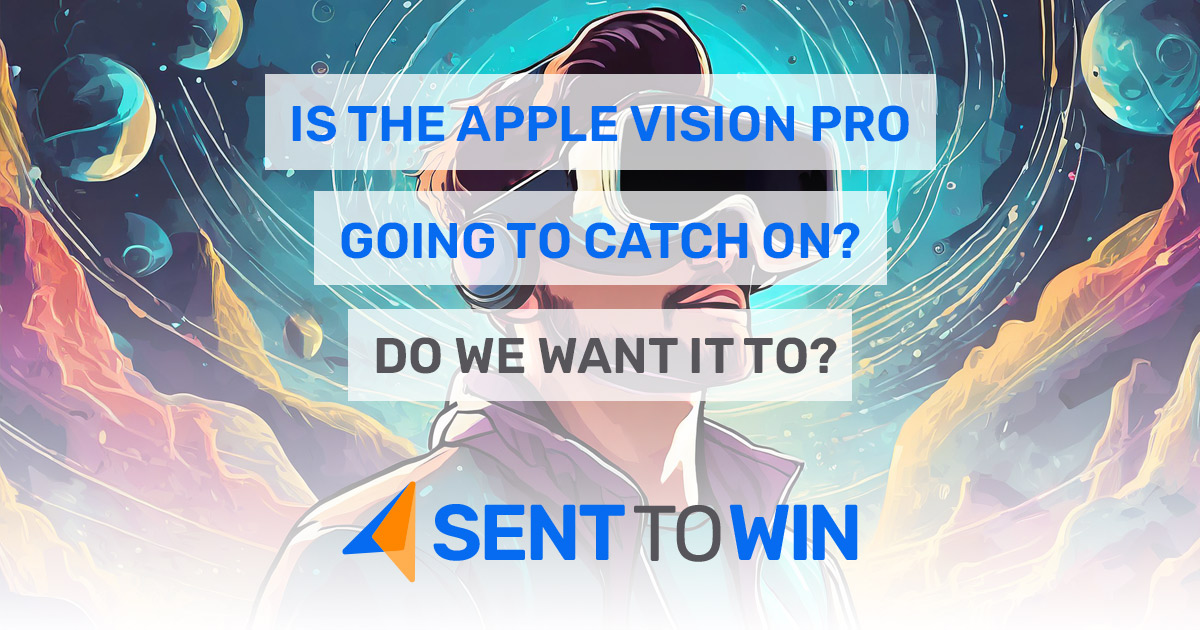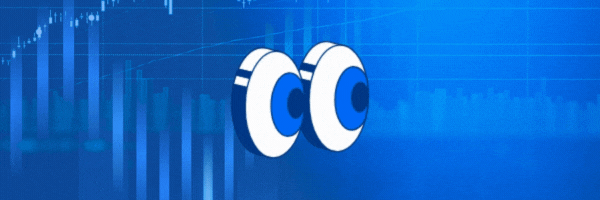Is the Apple Vision Pro Going to Catch On? Do We Want It to?
In today’s newsletter:
- Is the Apple Vision Pro Going to Catch On? Do We Want It to?
- Is Boeing Blowing It? Market Watch and a TikTok Ban in the Works
- The Science of Prayer and Meditation
It’s been just over a month since Apple’s Vision Pro went on sale, and the market wants to know:.
Is this the future? Or is it a repeat of Google Glass’ disastrous performance ten years ago?
The tech world is moving at lightning speed, and in the midst of generative AI and an onshore semiconductor boom, Apple tossed in its own name as a major player in the revolution with its launch of an immersive augmented reality (AR) headset – the company’s first truly new product line since Airpods, nearly ten years ago.
AR, as opposed to VR (virtual reality), is a technology that allows people to interact with the real world, albeit in an enhanced way. The idea is to see the temperature when you look outside, to see a little “connect” button hovering over Bluetooth-enabled devices in your home, or to play games like Pokémon Go, where characters are tied to real-world locations. Apple’s newest product allows the user to wear a two-pound set of goggles with an external battery pack, featuring state-of-the-art hand and eye-sensing technology that uses “pass-through screens” to show the user video what is right in front of them while allowing them to pull up windows, apps, and documents as well. “I think it’s something that doesn’t isolate people,” Tim Cook, CEO of Apple says. “We can use it to enhance our discussion, not substitute it for human connection, which I’ve always deeply worried about in some other technologies.”
To some, it seems as though he “doth protest too much,” as many reviewers report that the awe-inspiring technology is, in fact, deeply isolating.
“Using the Vision Pro is such a lonely experience,” Nilay Patel, editor and chief of The Verge, reports in an in-depth review of the device. “You’re in there, having experiences all by yourself that no one else can take part in.”
It’s an odd situation, for a CEO deeply worried about the isolating effects of technology, to release an immersive headset that crowds out the real world, giving you an inner solipsist reality instead. But this is just the beginning of seeming contradictions brought about by the Apple Vision Pro.
The technology is awe-inspiring – there should be no disputing that. For such small speakers and such small cameras and screens to adapt to the placement of your retinas and deliver high-definition, high-quality visuals that map the environment around you and allow you to “stick” digital visuals to real things visible in your display is a marvel on par with magic. But at the same time, the product comes with a bulky external battery pack connected to the headset by a cable – and the device turns off if you disconnect the cable. You can plug it into a wall, but then you’re stationary when the whole point of the thing seems to be mobility and constant usage.
Users report an absolutely awesome entertainment viewing experience along with nausea, vertigo, bloodshot eyes, and the inability to use it for more than a few minutes at a time without getting physically sick. The pass-through screens allow people to “see” your eyes as you wear it – but only in a ghostly, uncanny, difficult-to-see video projection that some find creepy. Over 200,000 headsets have been purchased already – but reports abound of widespread returns, as users find them difficult to set up, not useful, or too heavy to wear on their heads. “I just don’t want to wear a headset,” one commenter posted online in response to a YouTube review. “That’s enough reason for me.”
With a $3,500 price tag (closer to $5k once you factor in Apple Care, a carrying case, extra battery, etc.) and a U.S.-only release, Apple’s newest product is not affordable or accessible for the average consumer anyway – though they are working on a much cheaper version, possibly to cost $1,500, to be released in 2026. Wired magazine has quoted one expert as saying the entire release is a “product intended as a developer kit, rather than something truly meant for the average consumer.” That means that Apple is trying to woo third-party software designers to create applications for their new platform by showing that they can provide a market for said software. Other reviewers agree – Apple isn’t trying very hard to get consumers to buy this product right now. They want to convince developers to jump on board.
The alleged consumer stampede for the returns desk makes more sense in that light. And it’s a rather large risk for Apple – one that we may well say is brilliant a few years from now. Or, the Vision Pro could flop like Google Glass. Apple’s stock has been somewhat volatile since they announced the Vision Pro back in June of 2023, and currently its price is trending down this year, though some say it is undervalued. Only time will tell if the gamble pays off.
Still, some experts expect Apple to sell 400,000 or even 600,000 units this year, and, as with all Apple products, it is expected to iterate and improve. Apple has a well-attested knack for being early to market, though not first, strategically entering at just the right time to capture a dominant position. To that end, we have to ask the following questions – Is this the future? Will people really be walking around everywhere with a computer on their face? Do we even want that?
During the lockdown years, in the face of the COVID pandemic, Christians sometimes made the argument against the widespread wearing of facemasks because we are made in the image of God, and “that image is most seen by our face.” Certainly, the Imago Dei means something much greater and deeper than mere physical resemblance, but as Christians – or even as people of good conscience concerned for society’s best – do we really want to live in a world where we cannot see one another’s faces?
Most new technology seems clunky at first. An engineer in California made headlines for wearing his new Apple Vision Pro in his wedding photos – much to the apparent chagrin of his now-wife. Rolling Stone calls many public appearances of people wearing the device “embarrassing” and refers to users as “Apple zealots who don’t mind looking stupid as long as they get to feel like the hero of a sci-fi movie.” They even go so far as to refer to the tech as “Google Glass 2.0.” Police in San Diego remind citizens to stop crossing the street wearing the device, as it is distracting and could cost you your life.
All that to say, it is difficult to gauge the future from early judgments of early adopters – but it does seem clear that our collective gut reaction is that there is something less than human about wearing bug-eyed reflective goggles that cover half of your face at all times.
“I don’t want to get work done in the Vision Pro,” The Verge editor-in-chief says. “I get my work done with other people, and I’d rather be out here with them.”
In a world increasingly divided and balkanized, perhaps Christians should be most supportive of tech that does not further drive us into personalized fantasy worlds, instead finding common ground, seeing one another’s humanity so that we may see and serve people out there with the love of Christ. It’s hard to see them with all the floating apps in the way.
INDUSTRY INSIGHTS
Is Boeing Blowing It? Market Watch and a TikTok Ban in the Works
Is Boeing Blowing It?
Boeing is still under scrutiny and now facing a criminal inquiry after an Alaska Airlines flight experienced a door blowing off, terrifying passengers in January of this year. As more eyes settle on the aerospace giant, their manufacturing has been ruled as unsafe in many ways by the Federal Aviation Administration. One practice in particular has received criticism, called “traveled work,” where manufacturing is done out of order, often leading to opportunities for failure and overlooking known flaws. The plane that ultimately caused this controversy traveled out of sequence at the manufacturing plant, and Boeing knew of the faulty bolts – but they neglected to fix them due to complications in workflow. To make matters worse, there have been other recent problems with Boeing products, including a New Zealand flight that saw technical issues while flying a Boeing 787, resulting in 50 injuries. On Monday, a whistleblower with 32 years at the company, who had been in the process of bringing evidence against the company in a federal lawsuit concerning their negligent production practices, was found dead in his truck under suspicious circumstances. Boeing’s stock is down over 25% YTD, while their rival Airbus’s stock is up 12% over the same period.
Market Watch
The Dow Jones Industrial Average has been trending downward this week, though the gains in the S&P 500 and Nasdaq seem somewhat more durable. Some experts warn of the possibility of a market top after Nvidia’s incredible gains fell into a sharp slide this past week, losing 10% of its value in just a single day. 5-year T-Bills are still giving yields above 4%. However, yields have been slipping since the last week of February. Unemployment rose to 3.9% in February, up from 3.6% in January, and the coming CPI report for February is expected to show inflation heating up again. Though some continue to insist that the Fed will nonetheless stay on track for rate cuts soon, comments from Jerome Powell might seem to indicate otherwise, emphasizing that the central bank needs to see inflation heading toward their 2% target before making a move. Still, rate cuts seem likely later this year. Bitcoin is up to record highs, now over $70k, and the social media platform Reddit sets its sights on a $750 million IPO later this year.
A TikTok Ban in the Works
Top intelligence senators push a bill that would force ByteDance, the company that owns TikTok, to either divest its ownership or be banned in the U.S. The social media app, which has been labeled a “powerful propaganda tool” and a “national security issue” because it gives the Chinese Communist Party tremendous cultural influence in America, is facing a strongly bipartisan effort to eliminate it. The bill is set to be voted on this week, and President Biden says he will sign the bill if it passes. For his part, Donald Trump is against a TikTok ban, saying that losing TikTok will only increase the power of Meta (the parent company of Facebook and Instagram), which he calls the “enemy of the people.” Republicans and Democrats alike seem undeterred by his advice, however, and the popular social media app may soon change hands or disappear from our soil entirely, with clear implications for digital marketers currently leaning on the app for visibility and growth.
Sunday School
Q. What are the seven churches in Asia that receive a short letter in the Book of Revelation? Can you name them all?
A. Ephesus, Smyrna, Pergamum, Thyatira, Sardis, Philadelphia, and Laodicea.

“I get that you want to schedule prayer into your day, but do you see how calling it “Big Meeting with the Boss” might be confusing for me?”
TIPS & TRICKS
The Science of Prayer and Meditation
“Mindfulness” has been a big buzzword in the business world over the last few years, a catchall term that includes things like reading for pleasure, attentive interpersonal behaviors, mental health, and, notably, meditation. It’s not just a fad, however; research suggests that investing in mindfulness can quickly improve performance across an organization, and some of the world’s most recognizable high performers practice some form of mindfulness. As a Christian leader, you ought to do so as well – especially prayer and meditation.
“Meditation” is a word that some Christians are uncomfortable with, but it shouldn’t be. The Lord tells Joshua to meditate on the Book of the Law. We see Isaac heading out to the field to meditate in Genesis 24. Psalms tells us that the man who meditates on God’s law is blessed.
Actually, Psalms talks about meditation quite a bit.
The point is, though we often think about meditation as solely in the purview of Buddhist monks on top of a mountain somewhere in Nepal, meditation comes in many forms and is, in fact, a deeply Christian practice, whether it be the more formalized monastic practice of Lectio Divina or simply quieting one’s heart, focusing on scripture, or listening for God in prayer. Meditation is about cutting out the distractions and busyness of life, slowing down, and being fully present in the moment, usually in silence or at least in quiet.
What is interesting is that this practice, though primarily a spiritual activity, also has measurable, real-world effects. And if you want to be healthy, productive, and creative, you shouldn’t skip out on your morning prayers and meditation. You just don’t perform well in your business when you’re stressed out, scattered, or unsettled. Thankfully, there are tried and true ways to regulate yourself so you can consistently walk into the office ready to do your best.
Research shows that meditation lowers stress, specifically cortisol levels. It can have a very positive effect on emotional and relational issues “which cannot be explained by mere relaxation or cognitive restructuring effects.” It can make us more focused and attentive. Meditation has been shown to have a positive impact on cognitive and non-cognitive functioning in such a way as to be positively correlated with engagement and possibly even job performance.
In fact, according to Harvard Business Review, more than half of American employers now offer some kind of mindfulness training to their workers – and this can have a noticeable benefit to results in the workplace, but only if the “right” kinds of meditation practice are used. Interestingly, this seems to involve meditation practices that emphasize love, forgiveness, and a servant’s mindset.
Sounds Christian to me.
Prayer and meditation reshape your brain, so don’t let it get squeezed out of your routine. First, let it be for seeking God – we absolutely have to have our priorities straight. But as a secondary matter, keep in mind that righteous living leads to good things – and that may just include productivity, focus, creativity, and emotional well-being. That has obvious implications for your work/career. God’s way really is best.
“The path of the righteous is like the morning sun, shining ever brighter till the full light of day.” – Proverbs 4:18.
Quick Hits
- Americans are increasingly using their 401(k)s as emergency cash.
- Elon Musk set to release a SmartTV app to rival YouTube TV.
- National Review’s Andrew T. Walker describes the media’s “religion problem.”
- The U.S. Department of Education recently announced that it was fining evangelical college Liberty University $14 million for failure to report campus crime and for its treatment of sexual assault victims.
- CNN reports that more Americans than ever do not believe in God or a higher power, but many are still reluctant to call themselves atheists.
Guess the Prompt
Our “Apple Vision Pro” graphic was generated using AI prompts. Guess the prompt for your chance to win Sent To Win gear. Just reply to this email with your best guess.
For Kingdom Leaders, By Kingdom Leaders
Bringing Kingdom-minded leaders like you fresh perspectives and insights on business, finance, and leadership trends.








